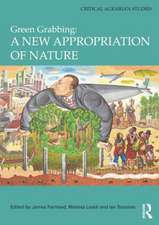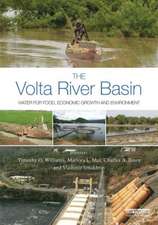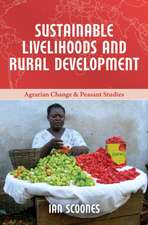Carbon Conflicts and Forest Landscapes in Africa: Pathways to Sustainability
Editat de Melissa Leach, Ian Scoonesen Limba Engleză Paperback – 2 iun 2015
The book’s case studies cover a wide range of African ecologies, project types and national political-economic contexts. By examining these cases in a comparative framework and within an understanding of the national, regional and global institutional arrangements shaping forest carbon commoditisation, the book provides a rich and compelling account of how and why carbon conflicts are emerging, and how they might be avoided in future.
This book will be of interest to students of development studies, environmental sciences, geography, economics, development studies and anthropology, as well as practitioners and policy makers.
| Toate formatele și edițiile | Preț | Express |
|---|---|---|
| Paperback (1) | 275.30 lei 6-8 săpt. | |
| Taylor & Francis – 2 iun 2015 | 275.30 lei 6-8 săpt. | |
| Hardback (1) | 1002.63 lei 6-8 săpt. | |
| Taylor & Francis – 8 iun 2015 | 1002.63 lei 6-8 săpt. |
Din seria Pathways to Sustainability
-
 Preț: 257.70 lei
Preț: 257.70 lei -
 Preț: 258.57 lei
Preț: 258.57 lei -
 Preț: 256.67 lei
Preț: 256.67 lei -
 Preț: 169.50 lei
Preț: 169.50 lei -
 Preț: 323.23 lei
Preț: 323.23 lei -
 Preț: 485.40 lei
Preț: 485.40 lei -
 Preț: 317.30 lei
Preț: 317.30 lei -
 Preț: 273.35 lei
Preț: 273.35 lei -
 Preț: 240.16 lei
Preț: 240.16 lei -
 Preț: 274.20 lei
Preț: 274.20 lei -
 Preț: 320.20 lei
Preț: 320.20 lei - 26%
 Preț: 762.97 lei
Preț: 762.97 lei -
 Preț: 272.37 lei
Preț: 272.37 lei -
 Preț: 319.43 lei
Preț: 319.43 lei -
 Preț: 273.57 lei
Preț: 273.57 lei -
 Preț: 322.27 lei
Preț: 322.27 lei -
 Preț: 274.45 lei
Preț: 274.45 lei - 17%
 Preț: 213.33 lei
Preț: 213.33 lei -
 Preț: 242.53 lei
Preț: 242.53 lei -
 Preț: 469.56 lei
Preț: 469.56 lei -
 Preț: 317.48 lei
Preț: 317.48 lei -
 Preț: 317.30 lei
Preț: 317.30 lei -
 Preț: 363.96 lei
Preț: 363.96 lei -
 Preț: 314.21 lei
Preț: 314.21 lei -
 Preț: 275.26 lei
Preț: 275.26 lei
Preț: 275.30 lei
Nou
Puncte Express: 413
Preț estimativ în valută:
52.68€ • 55.15$ • 43.59£
52.68€ • 55.15$ • 43.59£
Carte tipărită la comandă
Livrare economică 05-19 aprilie
Preluare comenzi: 021 569.72.76
Specificații
ISBN-13: 9781138824836
ISBN-10: 1138824836
Pagini: 250
Ilustrații: 7 black & white tables
Dimensiuni: 156 x 234 x 15 mm
Greutate: 0.39 kg
Ediția:1
Editura: Taylor & Francis
Colecția Routledge
Seria Pathways to Sustainability
Locul publicării:Oxford, United Kingdom
ISBN-10: 1138824836
Pagini: 250
Ilustrații: 7 black & white tables
Dimensiuni: 156 x 234 x 15 mm
Greutate: 0.39 kg
Ediția:1
Editura: Taylor & Francis
Colecția Routledge
Seria Pathways to Sustainability
Locul publicării:Oxford, United Kingdom
Public țintă
PostgraduateCuprins
1. Political Ecologies of Carbon in Africa 2. Forest Carbon Projects and Policies in Africa 3. Climate Emergency, Carbon Capture and Coercive Conservation on Mt. Kilimanjaro 4.Carbon in Africa’s Agricultural Landscapes A Kenyan Case 5. ‘Zones of Awkward Engagement’ in Ugandan Carbon Forestry 6. Implementing REDD+: Evidence from Kenya 7. Carbon Projects and Communities: Dynamic Encounters in Zambia 8. Struggles over Carbon in the Zambezi Valley: The Case of Kariba REDD in Hurungwe, Zimbabwe 9. Farming Carbon in Ghana’s Transition Zone: Rhetoric versus Reality 10. Old Reserve, New Carbon Interests: The Case of the Western Area Peninsula Forest, Sierra Leone
Recenzii
"Carbon forestry is privatizing, commodifying and financializing the world’s forests, recasting relations between state and market forest landscapes. This book illuminates the fraught political economy of this transformative moment – through lived experience within place-based histories. As the first comparative political ecology of carbon forestry politics, this book is essential reading for scholars and practitioners wishing to transform carbon forestry for the better."–Jesse Ribot, University of Illinois, USA
"This book not only synthesizes what we know about carbon forestry and illustrate how it has unfolded in Africa, it also critically reflects on the material, social and cultural life of carbon and how the latter features amidst dynamic ecologies and the development needs and aspirations of states and people. This is a brilliant book; a must read for scholars and activists interested in the commodification of environmental services and their likely consequences."–Esteve Corbera, Universitat Autònoma de Barcelona, Spain
"This book will help readers better understand why it is important to incorporate livelihood considerations and a landscape approach into the design and implementation of forest carbon projects."–Gretchen Walters, International Union for the Conservation of Nature (IUCN), Switzerland
"This piece of work is a critical revision of carbon projects as economic interventions that provide new value to ecosystems suffering from unsustainable use. Due to their economic relevance they have even become an interesting object for brokers, traders, and consultants and often developed a certain potential to create social distortions on the ground." – Challenges in Sustainability, Pierre L. Ibisch, Eberswalde University, for Sustainable Development, Germany
"This book not only synthesizes what we know about carbon forestry and illustrate how it has unfolded in Africa, it also critically reflects on the material, social and cultural life of carbon and how the latter features amidst dynamic ecologies and the development needs and aspirations of states and people. This is a brilliant book; a must read for scholars and activists interested in the commodification of environmental services and their likely consequences."–Esteve Corbera, Universitat Autònoma de Barcelona, Spain
"This book will help readers better understand why it is important to incorporate livelihood considerations and a landscape approach into the design and implementation of forest carbon projects."–Gretchen Walters, International Union for the Conservation of Nature (IUCN), Switzerland
"This piece of work is a critical revision of carbon projects as economic interventions that provide new value to ecosystems suffering from unsustainable use. Due to their economic relevance they have even become an interesting object for brokers, traders, and consultants and often developed a certain potential to create social distortions on the ground." – Challenges in Sustainability, Pierre L. Ibisch, Eberswalde University, for Sustainable Development, Germany
Descriere
This book examines the effectiveness of forest carbon projects in Africa, looking at efforts to conserve forest carbon stocks, reduce carbon emissions and offset emissions through trade in carbon credits. Drawing on a diverse range of original international case studies, the book analyses forest carbon projects in the context of the wider commoditisation of nature. It explores how these projects interact with the particular histories of forest landscapes and impact on local forest users. By examining these cases in a comparative framework, the book provides a rich and compelling account of how and why carbon conflicts are emerging, and how they might be avoided in future.






















